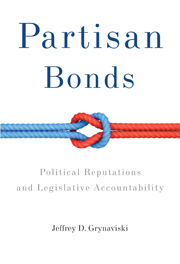4 - Party Unity and the Strength of Party Preferences
Published online by Cambridge University Press: 05 May 2010
Summary
The thesis of this book is that an important function that political parties perform is that of a surety who offers guarantees to the public about how they will evaluate the performance of politicians in office who carry the organization's label. For a party's nomination to represent a credible signal, it must be the case that the organization places in jeopardy an asset that it values in the event that too many of its members act in a manner inconsistent with voter expectations. The argument developed in Chapter 2 suggests that when too many party members break ranks and act contrary to party principles, the organization risks losing the support of its strongest backers who deliver votes and other more material types of support to its candidates, and it is a party's preference to avoid this penalty that makes party endorsements credible. The purpose of this chapter is to develop and test the micro-logic for why voters may reward parties for high levels of party unity in government.
THEORIES OF VOTER PARTISANSHIP
The building block of my theory of voter behavior is a rational-choice model of party evaluation and choice based on how people view the activities of party members in government. A great deal has been previously written on the basis for people's partisan preferences, so before getting to my model, it is instructive to first consider the state of the literature on this subject.
- Type
- Chapter
- Information
- Partisan BondsPolitical Reputations and Legislative Accountability, pp. 95 - 132Publisher: Cambridge University PressPrint publication year: 2010



